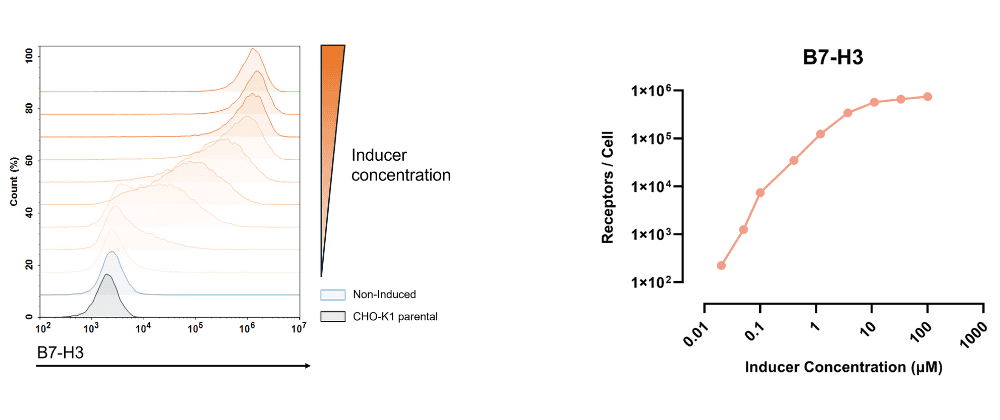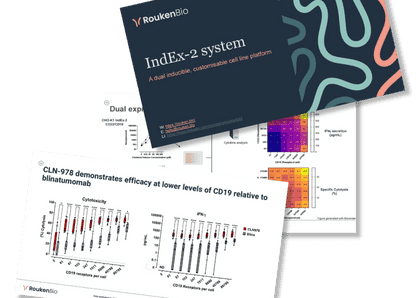Cell Lines
We specialise in creating cell lines for all stages of therapeutic development; cell-based bioassays for screening, selection, functional assessments, potency assays and lot release. Our expert team employ a range of molecular tools to create custom genetically engineered cell lines to specification and fit for the intended application.

Explore our toolbox of available cell lines
IndEx-2 cell lines
Reporter cell lines
IndEx-2 cell lines
IndEx-2 is an in vitro cell-based platform that provides inducible expression of your target antigen of interest (TAOI). It is an effective tool that can be used to enhance a pre-clinical data package with information that offers a more comprehensive understanding of a targeted drug's mechanism of action and functional profile.
- Safety: Gain information on the potential of “on-target, off-tumour effects” via precise control of TAOI expression to model physiological and pathological expression levels
- Efficacy: Determine the antigen density activation threshold of targeted immunotherapies, including immune cell engagers, ADCs and engineered immune cell therapies
We have a portfolio of predeveloped IndEx-2 cell lines in the CHO-K1 background which allow inducible expression of the TAOI upon the application of a small molecule inducer.
Don’t see your target antigen of interest? Contact Us to discuss the generation of a custom IndEx-2 cell line expressing your specific TAOI.
Predeveloped IndEx-2 cell lines:
B7-H3
BCMA
CD19
CD22
CD19/CD22
CEACAM5
CLDN3
CLDN18.2
cMET
DLK1
EGFR
EpCAM
FCRL5
FOLR1
GPRC5D
HER2
LRRC15
MUC16
PD-1
PD-L1
PSMA
STEAP1
STEAP3-2
TROP2
VEGFR2
B7-H3 (CD276)
Gene name: CD276
B7-H3 is a type I transmembrane protein and a member of the B7 family of immune checkpoint molecules. It plays a complex role in immune regulation, generally thought to inhibit T-cell activation, although some studies suggest a co-stimulatory role under certain conditions. The CD276 gene is frequently overexpressed in a wide range of solid tumours, including prostate, breast, non-small cell lung cancer (NSCLC), and glioblastoma, while its expression is limited in normal tissues. This tumour-restricted expression makes B7-H3 an attractive target for antibody-drug conjugates (ADCs), CAR-T cells, and other immunotherapeutic strategies.
CHO-K1 IndB7-H3
Cell Line background: CHO-K1 | Inducible Gene: B7-H3 | Species: Homo sapiens (Human) | UniProt: Q5ZPR3

Histograms and quantification of B7-H3 induction at 0-100 μM small molecule inducer
Cells were then stained with a labelled antibody and expression levels quantified using a bead-based quantification kit. Specific induction conditions should be further defined by the user. Cell line suitable for research and development use only.
Reporter cell lines
Reporter cell lines are produced and tested in-house:
- Jurkat NFAT: A Jurkat T-cell line expressing NFAT, designed to monitor T-cell receptor (TCR) activation.
- Jurkat PD-1/CHO PD-L1 reporter assay: A co-culture of Jurkat PD-1 and CHO PD-L1/TCR activator cells, to assess PD1/PDL1 targeting molecules.
- Jurkat FcγRIIIa (CD16) V176 NFAT: A Jurkat cell line expressing the FcγRIIIa (CD16) V176 receptor, used to assess CD16 engagement (ADCC).
- Jurkat FcγRIIIa (CD16) F176 NFAT: A Jurkat cell line expressing the FcγRIIIa (CD16) F176 receptor, used to assess CD16 engagement (ADCC).
- Jurkat FcγRIIa (CD32a) H167 NFAT: A Jurkat cell line with the FcγRIIa (CD32a) H167 variant, use to assess CD32 engagement (ADCP).
- Jurkat FcγRI (CD64) NFAT: A Jurkat cell line expressing FcγRI (CD64), designed to monitor Fc receptor signalling (ADCP).
- HEK293 SRE: A HEK293 cell line engineered to study multiple receptor signalling pathways by monitoring ERK1/2 signalling activation.
- HEK293 NFκB: A HEK293 cell line used to study various receptor pathways (e.g. TNFR1 or TLRs) via NFκB activation.
- Jurkat NKG2D reporter assay: A Jurkat cell line expressing the NKG2D allowing the assessment of NKG2D signalling after MICA/B engagement.
- HEK293 TSLPR/IL-7R STAT5: A HEK293 cell line co-expressing TSLPR and IL-7R, designed to monitor STAT5 signalling in response to receptor activation.
- HEK293 STAT6: A HEK293 cell line engineered to study IL-4/IL-13 receptor signalling through STAT6 activation.
- CHO-K1 TrkB NFAT: A CHO cell line expressing the TrkB receptor, used to monitor TrkB signalling pathways via NFAT activation.
- CHO-K1 Tie Reporter assay: A CHO cell line expressing the Tie2 receptor, designed to monitor Tie2 signalling through an undisclosed pathway.
New cell lines are continuously under development so do not hesitate to contact us for more information.
Delve into real dual inducible data with IndEx-2
Discover the latest dual inducible IndEx-2 data and dive into two in-depth CAR-T case studies in our exclusive technical slide deck.
Access the slide deck
